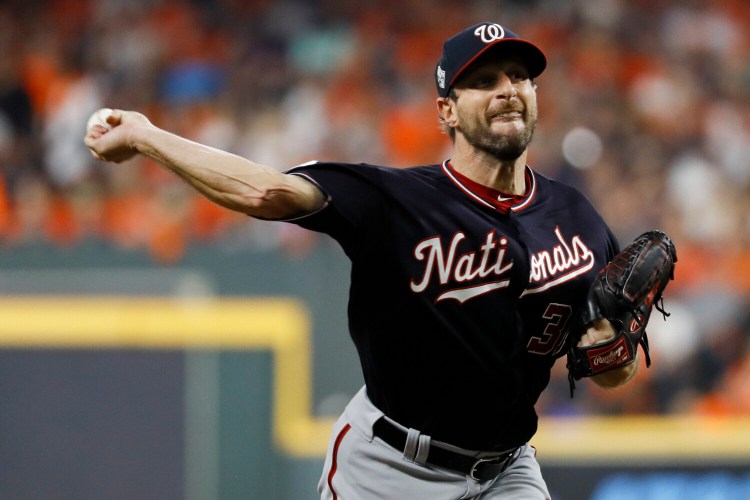If there is a Game 7 of the World Series, Max Scherzer will be on the mound.
The 35-year-old Washington right-hander missed his scheduled start in Game 5 because of an irritated nerve near his neck, and Houston beat substitute starter Joe Ross to take a 3-2 Series lead.
Scherzer had a cortisone shot in his neck Sunday and threw in the outfield Tuesday before Game 6.
Nationals Manager Dave Martinez says “as of now, he’ll definitely start Game 7.”
“He threw. He felt good,” Martinez says.
The Nationals ace had thrown in the outfield for about 10 minutes on Tuesday and, other than one exaggerated roll of his neck, seemed like himself again. He mixed soft tosses with hard throws and breaking balls. Scherzer passed a group of reporters and, two days after a doctor’s diagnosis forced the team to scratch him from Game 5 of the World Series, offered one of his own.
“I’m good,” he said, unprompted, eyes wide, head nodding.
WITH EVERY pitch at the World Series hurtling toward that strike zone box superimposed on TV screens, the call gets louder and louder: Bring on the robot umps!
All 40,000 umpires in the stands watching Game 5 Sunday at Nationals Park were sure they could tell: Gerrit Cole’s fastball to Victor Robles missed the strike zone. That’s not how Lance Barksdale saw it. He rung up Robles on strike three, leaving the Washington rookie hopping mad, and soon the ballpark was filled with angry chants at the plate umpire.
“That’s a hot topic,” Houston Manager AJ Hinch said Monday. “This is a big stage to be talking about hot topics. I guess it’s always possible.”
“I think it’s a little naive to think that simply letting computers generate strike or ball,” he said, “it’s incredibly naive to think that there’s not going to be pitfalls in that scenario, as well.”
Major League Baseball is exploring the possibilities. The Arizona Fall League, made up of baseball’s top prospects, used computers to call pitches over the past month.
A day before his Astros took a 3-2 lead into Game 6 on Tuesday night, Hinch saw both sides of the debate.
“I’m always interested in improving the game. I’m interested in advancing things that maybe we didn’t think 10 years ago that were relevant. And now all of a sudden that they are,” he said. “If we can better the game, I’m all for it. And perhaps that’s an avenue that we’re going to go down some day.”
If that happens, Hinch had one more thought.
“Be careful what you wish for,” he said.
RATINGS: Fans in Washington and Houston may be excited, but the rest of the country is reacting to the World Series with a collective yawn.
Through the first five games, the World Series has been averaging 11.6 million viewers, the Nielsen company said. That puts it on pace to be the least-watched Fall Classic ever, although ratings tend to pick up when a series reaches a sixth or deciding seventh game. Game 6 was Tuesday in Houston.
The previous low point came in 2012, when an average of 12.64 million viewers watched the San Francisco Giants complete a four-game sweep over the Detroit Tigers.
From an audience perspective, the Series was really hurt Sunday night, when 18.3 million people watched an NFL game between Green Bay and Kansas City compared to the 11.4 million who tuned into baseball at the same time. That’s the widest viewership margin an NFL game has ever had over a World Series game at least since Nielsen began keeping more precise records in 1987.
Copy the Story Link
Comments are not available on this story.
Send questions/comments to the editors.


